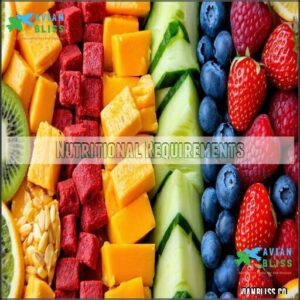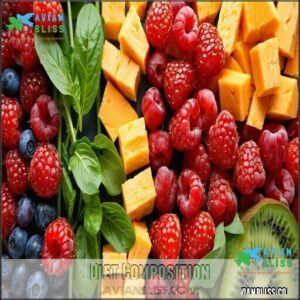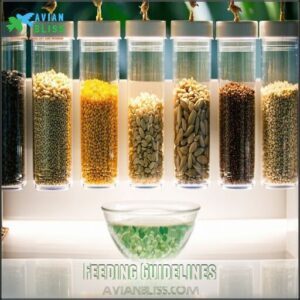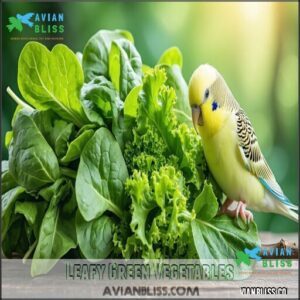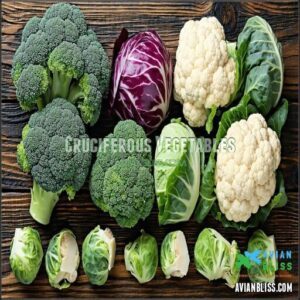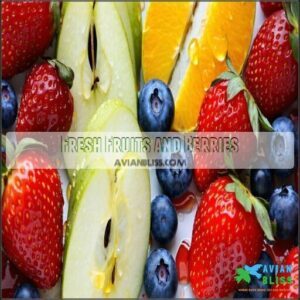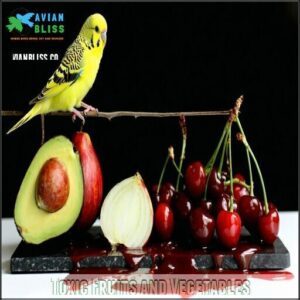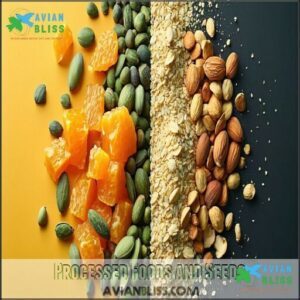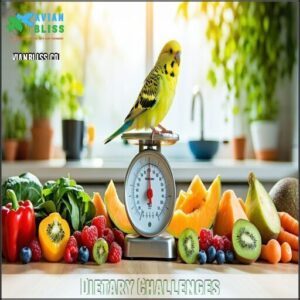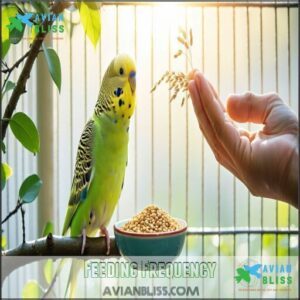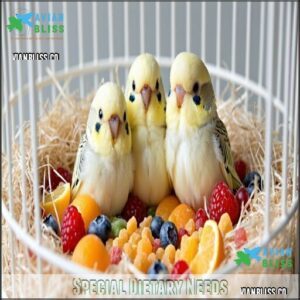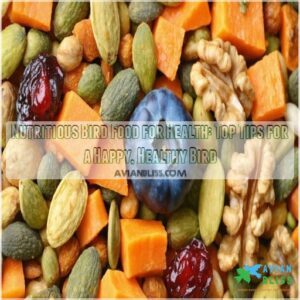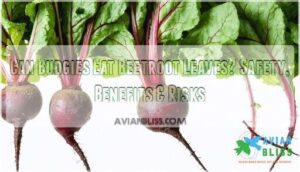This site is supported by our readers. We may earn a commission, at no cost to you, if you purchase through links.
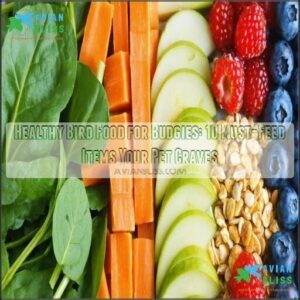 To keep your budgie healthy and chirping, focus on a balanced diet. Start with high-quality seed mixes, but don’t stop there—too many seeds can lead to weight gain.
To keep your budgie healthy and chirping, focus on a balanced diet. Start with high-quality seed mixes, but don’t stop there—too many seeds can lead to weight gain.
Add fresh vegetables like spinach, kale, and carrots for vitamins, and toss in fruits like apple slices (no seeds!) or berries for a treat.
Pellets are a great staple, offering balanced nutrition, while occasional protein sources like boiled egg or cooked quinoa can boost energy.
Always keep fresh water available, and avoid harmful foods like avocado, chocolate, or salty snacks. A little variety keeps your feathered friend happy and thriving—more on that later, with a focus on creating a healthy environment and providing proper care.
Table Of Contents
- Key Takeaways
- Nutritional Requirements
- Diet Composition
- Feeding Guidelines
- Safe Foods
- Harmful Foods
- Dietary Challenges
- Essential Nutrients
- Feeding Frequency
- Special Dietary Needs
- Healthy Eating Tips
- Frequently Asked Questions (FAQs)
- What is the healthiest food for budgies?
- Are seeds or pellets better for budgies?
- What is a budgie’s favourite vegetable?
- What fruit and vegetables are safe for budgies?
- How can I make homemade budgie treats?
- What are signs of food allergies in budgies?
- How do I store bird food properly?
- Can budgies eat herbs like parsley or basil?
- What are seasonal foods for budgies?
- Conclusion
Key Takeaways
- Focus on a balanced diet with 75-80% pellets, 10-20% fresh veggies and fruits, and seeds as occasional treats.
- Avoid harmful foods like avocado, chocolate, onions, and salty snacks to keep your budgie safe.
- Offer variety and rotate foods weekly to prevent boredom and ensure complete nutrition.
- Provide clean water daily, and remove uneaten fresh food to avoid bacterial growth.
Nutritional Requirements
Your budgie needs a balanced mix of proteins, carbohydrates, fats, vitamins, and minerals to thrive.
A healthy budgie thrives on a balanced diet of proteins, carbs, fats, vitamins, and minerals for vibrant energy and well-being.
You’ll want to provide a diet consisting of 75-80% quality pellets, supplemented with seeds, fresh fruits, and vegetables to meet all their nutritional needs, including a good mix of proteins.
Protein Sources
Your budgie needs high-quality protein for muscle development and healthy feathers.
Seeds like millet, sunflower, and hemp provide essential amino acids, while small amounts of insect protein from mealworms can supplement their diet.
Plant-based protein sources such as legumes offer complete proteins without overfeeding.
Protein supplements specifically formulated for budgies can help guarantee they receive all necessary amino acids, especially during molting periods.
Carbohydrates and Energy
While protein builds your budgie’s body, carbohydrates fuel their energetic lifestyle.
Your feathered friend needs a steady supply of carbs to maintain their characteristic bouncy behavior and high metabolism.
Complex carbs should form the foundation of your budgie’s energy sources:
- Whole grains like millet and oats provide sustained energy
- Vegetables contain fiber-rich complex carbs
- Fruits offer simple sugars for quick energy boosts
The importance of these carb sources cannot be overstated, as they directly impact your budgie’s overall health and high metabolism.
Fats and Feather Health
Just as energy keeps your budgie active, healthy fats maintain those vibrant feathers they’re known for.
Essential fatty acids support feather development during molting periods. Look for seed varieties with flaxseeds, chia, and small amounts of sunflower seeds – they’re packed with omega fatty acids.
But be careful with supplementation risks – too many fatty seeds can lead to obesity. Moderation is key for balanced budgie nutrition.
Vitamins and Minerals
While proper fats maintain your budgie’s beautiful plumage, vitamins and minerals are the behind-the-scenes workers keeping your feathered friend healthy.
These nutrients strengthen your budgie’s immune system and support overall health.
Look for Natural Sources like dark leafy greens for vitamin A and calcium.
Colorful vegetables provide vitamin C for Immune Boost.
Signs of vitamin deficiency include dull feathers and lethargy.
Consider budgie vitamin supplements only when necessary, as excessive amounts can be harmful.
Diet Composition
You’ll need to balance your budgie’s diet with 60-80% quality seed mix and 20-25% fresh fruits and vegetables.
Pellets and supplements can fill nutritional gaps, but they shouldn’t replace the variety that mimics your bird’s natural eating habits, providing a balanced diet with quality seed mix.
Seed Mixes
Your budgie’s daily diet should include high-quality seed mixes that make up 60-70% of their food intake.
Look for fortified mixes containing millet, canary seed, and small amounts of sunflower seeds.
Sprouting seeds can boost nutritional value, while organic options minimize pesticide exposure.
Storing seeds properly can preserve seed quality.
Store seeds in airtight containers to maintain freshness.
Remember, variety is key to a healthy budgie diet, and using high-quality seed mixes is essential.
Fresh Fruits and Vegetables
While seeds form the foundation of your budgie’s diet, fresh fruits and vegetables should make up 10-20% of their daily menu.
Wash all produce thoroughly to remove pesticides unless they’re organic. Serve raw fruits like apples, strawberries, and grapes cut into small pieces.
For vegetables, offer carrots, peas, and broccoli daily. Consider exploring options for budgie-friendly fruit products to supplement their diet.
Remove uneaten fresh food at day’s end to prevent bacterial growth and ensure a healthy diet for your budgie.
Pellets and Supplements
Your budgie needs more than just seeds to thrive.
Nutritionally balanced pellets should make up 75-80% of their diet, providing complete nutrition without artificial additives.
When switching to pellets, mix them gradually with seeds over several weeks.
Many owners find quality budgie pellets are a great option.
Supplement types include calcium (crucial during breeding) and amino acids (for healthy feathers during molting).
Always follow dosage guidelines on packages and consult your vet before adding any new supplements to ensure a healthy diet.
Feeding Guidelines
You’ll need to provide your budgie with 1.5 to 2 tablespoons of seed daily, replacing food and cleaning dishes regularly to maintain freshness.
Make sure clean water is always available, changing it daily to prevent contamination and support your bird’s high metabolism needs.
Daily Seed Intake
Your budgie’s daily seed intake is more precise than you might think.
Most budgies require 1.5-2 tablespoons of seed mix daily – not handfuls! Measuring intake helps prevent obesity risks while ensuring proper nutrition.
Offer a variety of seeds including millet and canary seed, and consider sprouted seeds occasionally for added nutrients.
Remember, seeds should make up 75-80% of your budgie’s balanced diet.
Food Dish Management
Now that you know how much seed your budgies need, let’s talk about managing their dining area.
Provide separate dishes for each bird to prevent squabbles during mealtime. Replace food daily to maintain freshness and clean dishes thoroughly to avoid bacteria buildup.
Position dishes at comfortable heights and away from perches to minimize droppings in food. Your budgie’s grazing habits work best with proper food presentation throughout the day, ensuring a clean and healthy environment.
Water Provision and Hygiene
While managing your budgie’s food dishes correctly, don’t overlook water provision. Your feathered friend needs fresh water daily, changed at least once every 24 hours.
Clean water dishes thoroughly to prevent harmful bacteria growth. Watch for signs of dehydration like sticky droppings or lethargy.
Avoid water additives unless recommended by a vet. Most budgies enjoy bathing opportunities too—proper hydration supports overall bird health.
Safe Foods
You’ll find many safe and healthy foods to offer your budgie beyond basic seed mixes.
From leafy greens to colorful berries, these nutritious options provide essential vitamins and minerals your feathered friend needs.
Leafy Green Vegetables
Leafy greens offer five essential nutrients your budgie needs for peak health. When serving these nutrient-dense vegetables, always thoroughly wash them to remove pesticide residues.
- Spinach and kale pack vitamins but limit during molting
- Dandelion and turnip greens promote variety in their diet
- Sprouts provide flavor-packed nutrition that’s easy to grow
- Wrap greens around other foods for mental stimulation
- Serve most leafy vegetables raw after proper cleaning to ensure they provide the best nutrient-dense benefits and support overall well-being.
Cruciferous Vegetables
Beyond leafy greens, cruciferous vegetables offer excellent nutrition for your budgie.
Broccoli benefits include vitamins A and C—serve it lightly steamed in tiny florets. Watch kale concerns like pesticides by washing thoroughly.
Different cabbage types provide variety, while cauliflower prep is simple—just offer small, raw pieces.
Brussels sprouts should be well-cooked and offered sparingly. These bird-safe vegetables make perfect additions to your budgie’s diet, with cruciferous vegetables offering a range of excellent nutrition.
Fresh Fruits and Berries
Fresh fruits and berries add vibrant color and essential nutrients to your budgie’s diet.
After introducing cruciferous vegetables, try offering these antioxidant-rich treats in small, bite-sized pieces (about 5% of total diet).
- Blueberries provide potent antioxidant benefits
- Apple slices (seeds removed) offer natural sweetness
- Strawberries deliver vitamin C in a budgie-friendly package
Proper fruit preparation prevents spoilage.
Wash thoroughly, remove seeds/pits, and serve variety in moderation to prevent sugar overload.
Strawberries offer high water content for hydration and are a good source of antioxidant benefits.
Harmful Foods
You’ll need to keep certain foods away from your budgie to prevent serious health problems.
Common items like avocados, chocolate, onions, and garlic can cause toxic reactions that may harm your pet’s digestive system and overall health.
Toxic Fruits and Vegetables
While preparing meals for your budgie, be vigilant about toxic fruits and vegetables.
Avocado contains persin that can be fatal, while onions and garlic cause dangerous blood cell damage.
Never feed your pet fruit pits from cherries, peaches, or apricots as they contain cyanide.
Rhubarb poisoning can occur from its leaves, and green tomatoes are equally harmful.
Chocolate should also be strictly avoided.
Processed Foods and Seeds
While toxic fruits pose immediate dangers, processed foods and low-quality seeds create long-term health issues for your budgie.
Commercial seed mixes often contain artificial preservatives and excess salt that burden their tiny systems. Avoid heavily processed treats, artificially colored birdseed, and old, dusty seed mix.
Instead, choose high-quality fortified seeds, properly sprouted seeds, and pellets with natural ingredients. Your budgie’s liver can’t process artificial additives like yours can, which is a critical consideration for their long-term health.
Dietary Challenges
You’ll face some hurdles when introducing new foods to your budgie, as these small parrots often reject unfamiliar items until they’ve been offered multiple times.
Your patience will pay off when you consistently present colorful, finely-cut fruits and vegetables while observing how your bird’s eating habits change over time.
Picky Eating Habits
Many budgies display remarkably picky eating habits that can challenge even the most patient owners.
Your feathered friend may take months to accept new foods, showing clear preferences for texture and color.
- Brightly colored foods typically attract budgies more than dull options
- Seeds are often selected individually, with favorites picked out first
- Small, bite-sized pieces or thinly sliced vegetables increase acceptance rates
Introduce food changes gradually, respecting your budgie’s natural selectivity.
Monitoring Flock Behavior
While encouraging budgies to try new foods, watch how your flock behaves during mealtimes.
Social dynamics substantially influence eating patterns.
| Behavior | What It Means | Action Needed |
|---|---|---|
| Food competition | Dominant birds monopolizing dishes | Add more feeding stations |
| Scattered seeds | Selective eating or poor food quality | Try different budgie food varieties |
| Minimal foraging | Possible illness or boredom | Introduce foraging toys |
| Excessive waste | Rejecting certain foods | Adjust bird nutrition offerings |
Tracking these bird care tips helps identify dietary preferences and health concerns. Social dynamics play a crucial role in this process.
Essential Nutrients
Your budgie needs specific nutrients to thrive, just like you need a balanced diet to stay healthy.
You’ll find that calcium, amino acids, and vitamins play essential roles in supporting breeding, feather growth, and overall wellbeing of your feathered friend.
Calcium for Breeding
While picky eating can challenge any budgie owner, ensuring proper calcium intake becomes a top priority during breeding season.
Your feathered friend needs calcium for strong eggshell formation and healthy chick development.
Unlike other nutrients, birds can’t produce calcium naturally.
Offer cuttlebone, oyster shell, or specialized calcium supplements 2-3 times weekly in drinking water.
Be careful though—calcium supplements without Vitamin D3 won’t be properly absorbed by your budgie.
Amino Acids for Feather Growth
Amino acids are essential for feather health and protein synthesis, especially during molting.
Without them, your budgie may show deficiency symptoms like brittle feathers.
Boost their diet with these strategies:
- High-protein seeds like millet and hemp.
- Egg food supplements for molting amino support.
- Leafy greens rich in essential amino acids.
A balanced budgie diet guarantees vibrant, healthy feathers!
Vitamin Supplements
How do you know if your budgie needs vitamin supplements?
Watch for deficiency signs like dull feathers or low energy.
Stick to safe brands designed for budgie health food, avoiding over-supplementation risks.
Budgie mineral supplements can fill gaps, but dosage concerns matter—too much can harm.
Balance supplements with fresh budgie food to guarantee a varied, nutrient-rich diet.
Feeding Frequency
Feeding your budgie at the right times keeps their energy up and supports their active lifestyle.
Offer meals in the morning and evening to match their natural eating patterns and high metabolism.
Morning and Evening Feeding
A consistent feeding schedule keeps your budgie’s metabolism humming.
Offer food twice daily—morning and evening—for balanced energy.
Follow these budgie feeding tips:
- Serve fresh budgie food each time.
- Stick to portion timing for routine importance.
- Guarantee a budgie balanced diet with variety.
- Remove leftovers to maintain freshness.
- Observe eating patterns for metabolic needs.
The key to a healthy budgie is maintaining a routine that includes fresh budgie food.
Portion Control and Obesity Prevention
Maintaining proper portion sizes is key to a balanced budgie diet. Overfeeding can lead to obesity, so stick to 1.5-2 teaspoons of seeds daily.
Monitor your budgie’s weight weekly and encourage exercise with toys or flight time. Limit treats to avoid excess calories.
A balanced diet keeps your bird healthy and active, ensuring long-term weight management. Like humans, budgies can develop obesity from a variety of factors, so environmental enrichment matters.
| Tip | Why It Matters | Action Plan |
|---|---|---|
| Measuring Portions | Prevents overfeeding | Use a teaspoon for seeds |
| Weight Monitoring | Tracks health changes | Weigh weekly on a scale |
| Exercise Importance | Burns excess calories | Provide toys or free-fly |
| Limiting Treats | Reduces calorie intake | Offer sparingly |
| Balanced Diet | Supports overall health | Include veggies and pellets |
To ensure your budgie stays healthy, remember that environmental enrichment and a balanced diet are crucial. By following these guidelines, you can help prevent obesity and keep your bird active and healthy.
Adjusting Feed According to Metabolism
Adjusting your budgie’s food based on their metabolism keeps them healthy.
Factors like activity levels, age, and environmental temperature play a role.
Here’s how to match their dietary needs:
- Increase portions during the breeding cycle or molting impact.
- Reduce seeds for older, less active birds.
- Offer extra veggies in warmer weather.
- Monitor weight to maintain a budgie balanced diet.
Special Dietary Needs
Budgies have unique dietary needs that change with age, breeding, and health conditions.
Understanding these requirements helps you provide the right nutrition for baby, breeding, or senior budgies to keep them thriving.
Baby Budgies and Seed Mixes
Baby budgies rely on crop milk initially, but their weaning process requires a gradual introduction to a budgie seed mix.
Start with softened millet to ease digestion. Seed preparation is key—crush or soak seeds for easy consumption.
Balance their nutritional needs by mixing pellets and fresh foods. They also have specific calcium to phosphorus requirements for bone health.
Shifting to adult budgie food takes patience, ensuring healthy growth and development.
Breeding Budgies and Nutrient Boost
If you’ve got breeding budgies, their diet needs a boost to support egg formation and chick growth.
Focus on a calcium-rich diet and breeding supplements to meet their unique needs:
- Cuttlebone or mineral blocks for calcium needs.
- Protein-packed seeds like hemp or sunflower for energy.
- Leafy greens such as kale for molting support.
Senior Budgies and Easy-to-Digest Foods
Senior budgies benefit from soft food options that support their digestion health and joint support.
Offer fresh fruits, cooked vegetables, and pellets designed for easy digestion. Hydration strategies like accessible water bowls are essential.
Supplements can meet specific budgie dietary needs.
| Food Type | Benefits | Examples |
|---|---|---|
| Soft Foods | Gentle on digestive system | Cooked carrots |
| Hydrating Foods | Supports hydration strategies | Fresh berries |
| Supplements | Boosts nutrient absorption | Calcium powder |
The table provides a summary of the different food types and their benefits, along with examples of each.
Healthy Eating Tips
Making sure your budgie eats well isn’t just about what you feed—it’s also about how you offer it.
Healthy eating for your budgie means offering variety, encouraging foraging, and creating a natural, engaging mealtime experience.
By rotating foods, avoiding too many supplements, and encouraging natural foraging, you’ll keep your pet happy and healthy.
Providing Variety and Rotation
Keeping your budgie’s diet fresh prevents dietary boredom and supports health. Rotation benefits include better nutrition and reduced picky eating. Seasonal foods make bird food variety exciting. A varied diet supports essential nutrient sources.
- Offer a budgie food list with rotating fruits like apples, berries, and melons.
- Introduce new vegetables like broccoli or kale weekly.
- Mix seeds and pellets for a balanced budgie diet.
Avoiding Over-Supplementation
Over-supplementation can harm your budgie, leading to issues like hypervitaminosis or mineral imbalances.
Stick to natural alternatives and use bird supplements sparingly. Always follow veterinary guidance to prevent vitamin D toxicoses or nutritional disorders.
| Risk | Cause | Solution |
|---|---|---|
| Supplement toxicity | Overuse of vitamins | Use only vet-approved doses |
| Hypervitaminosis | Excess vitamin intake | Limit fortified foods |
| Mineral imbalances | Too many added minerals | Opt for a balanced diet |
The table outlines specific risks associated with over-supplementation, including supplement toxicity, and provides solutions to mitigate these risks, such as using only vet-approved doses and limiting fortified foods.
Encouraging Foraging and Natural Behavior
Mimic a wild diet by introducing foraging toys and puzzle feeders to spark natural foraging behavior.
Scatter budgie foraging food like seeds or chopped vegetables around the cage to reduce boredom.
Social feeding, where budgies eat together, encourages activity.
Rotate natural budgie food and treats to keep meals exciting while creating a natural environment that promotes healthy habits.
Frequently Asked Questions (FAQs)
What is the healthiest food for budgies?
Ever wonder what keeps your budgie thriving? A mix of 75% pellets, 20% fresh veggies, and 5% fruits is ideal. Add seeds sparingly for protein, and always provide clean water daily.
Are seeds or pellets better for budgies?
Pellets are better for balanced nutrition, but seeds mimic a budgie’s natural diet.
A mix works best—75-80% pellets with seeds as treats.
This combo guarantees they get essential nutrients while enjoying familiar favorites, with seeds as treats being a key part of this balance.
What is a budgie’s favourite vegetable?
Crunchy carrots and vibrant broccoli often win a budgie’s heart.
Their bright colors and crisp textures appeal to their curious nature.
Chop them into tiny pieces, and you’ll see your feathered friend happily nibbling away!
What fruit and vegetables are safe for budgies?
Budgies can safely enjoy fruits like apples, blueberries, and melons, and vegetables like carrots, broccoli, and kale.
Avoid toxic foods like avocado, rhubarb, and onions.
Always wash, slice, or grate items for easy eating.
How can I make homemade budgie treats?
Mix oats, millet, and finely chopped fruits like apples or blueberries with a touch of honey.
Shape into small balls, bake lightly, and cool.
These nutritious treats are fun, and budgie-approved!
What are signs of food allergies in budgies?
Keep an eye out for red flags like sneezing, itching, or swelling around the eyes.
If your budgie starts avoiding food or showing diarrhea, it’s likely reacting to something in its diet.
How do I store bird food properly?
Store bird food in an airtight container, away from sunlight and moisture, to keep it fresh.
Use a cool, dry place like a pantry.
Check for expiration dates and toss anything stale or moldy.
Can budgies eat herbs like parsley or basil?
Yes, budgies can eat herbs like parsley and basil.
They’re safe and packed with nutrients.
Just wash them thoroughly to remove any pesticides.
Offer small amounts as treats, and watch your bird enjoy the fresh flavors!
What are seasonal foods for budgies?
Seasonal foods for budgies include figs, berries, and melons in summer.
While winter options might include kale, broccoli, or carrots.
Always wash produce thoroughly and introduce new foods gradually to avoid upsetting their diet.
Conclusion
Picture your budgie’s diet as the key to discovering its vibrant, chirping world.
By offering healthy bird food for budgies, like fresh vegetables, fruits, and balanced pellets, you’re ensuring they thrive.
Keep seeds in moderation, add occasional protein, and always provide clean water.
Avoid harmful foods to protect their health.
A varied diet doesn’t just nourish—it keeps them active and happy.
With proper care, you’ll enjoy a lively, healthy companion for years to come.
- https://www.birdcagesnow.com/blogs/bird-blog/english-budgies-parakeets
- https://pubmed.ncbi.nlm.nih.gov/9929897/
- https://www.sciencedirect.com/topics/pharmacology-toxicology-and-pharmaceutical-science/cruciferous-vegetables
- https://rwsboa2011.blogspot.com/2013/09/thorny-devil-bearded-dragon-budgerigars.html?m=1
- https://www.xn--krnerbude-07a.de/

